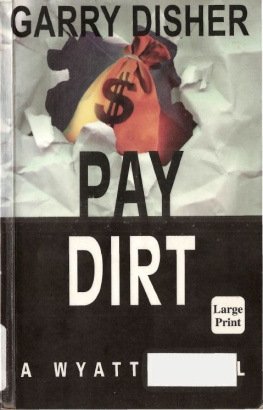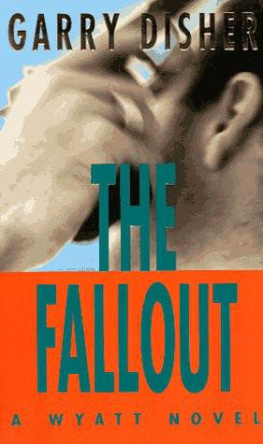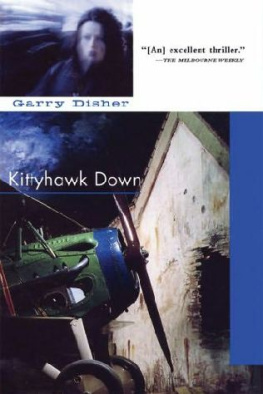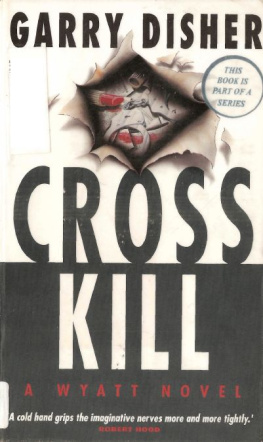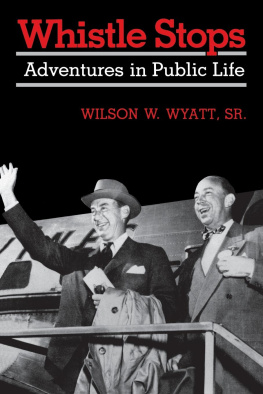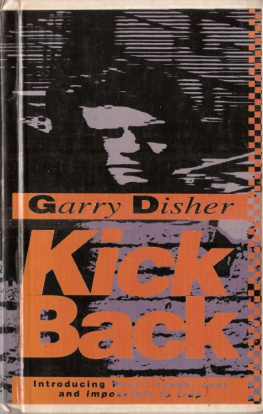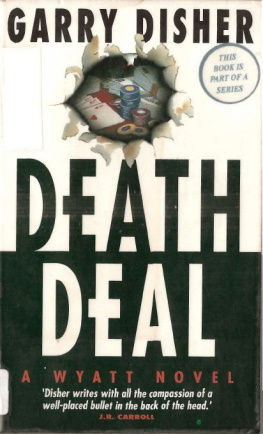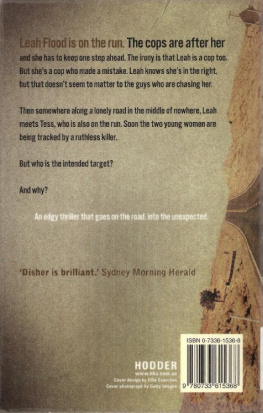Garry Disher - Paydirt
Here you can read online Garry Disher - Paydirt full text of the book (entire story) in english for free. Download pdf and epub, get meaning, cover and reviews about this ebook. year: 1998, publisher: Thomas T Beeler, genre: Detective and thriller. Description of the work, (preface) as well as reviews are available. Best literature library LitArk.com created for fans of good reading and offers a wide selection of genres:
Romance novel
Science fiction
Adventure
Detective
Science
History
Home and family
Prose
Art
Politics
Computer
Non-fiction
Religion
Business
Children
Humor
Choose a favorite category and find really read worthwhile books. Enjoy immersion in the world of imagination, feel the emotions of the characters or learn something new for yourself, make an fascinating discovery.
- Book:Paydirt
- Author:
- Publisher:Thomas T Beeler
- Genre:
- Year:1998
- Rating:4 / 5
- Favourites:Add to favourites
- Your mark:
- 80
- 1
- 2
- 3
- 4
- 5
Paydirt: summary, description and annotation
We offer to read an annotation, description, summary or preface (depends on what the author of the book "Paydirt" wrote himself). If you haven't found the necessary information about the book — write in the comments, we will try to find it.
Paydirt — read online for free the complete book (whole text) full work
Below is the text of the book, divided by pages. System saving the place of the last page read, allows you to conveniently read the book "Paydirt" online for free, without having to search again every time where you left off. Put a bookmark, and you can go to the page where you finished reading at any time.
Font size:
Interval:
Bookmark:


* * * *
Pay Dirt
[Wyatt 02]
By Garry Disher
Scanned & Proofed By MadMaxAU
* * * *
ONE
Thework was dirty, the little town a joke, but Wyatt was interested only in theadvantagesthey didnt know who he was, there were no cops, and no one was expectinga payroll snatch.
He was up to his elbows in greasewhen the money arrived. The Steelgard security van appeared at the cemeterycorner in a cloud of dust, crept past the bowling green clubhouse, and slowedfor the gate in the temporary fence that separated the construction camp fromthe town. He watched the van lurch through the gate into the camp and stopoutside Brava Constructions site office, fifty metres from where he wasgetting his hands dirty. He checked the time: midday. He saw two men get out.They began to haul cash-boxes into the site office. When one of them glanced inhis direction, Wyatt bent over his work again and got some more dirt onhimself.
He was in the Brava Construction repairshop, servicing gearboxes. On previous Thursdays hed been with the crewslaying pipes across the wheat flats north of the town, but this time hed paidone of the Chileans fifty bucks to swap with him and now he was up to hiselbows in grease, watching the money arrive.
Normally Wyatt never pulled a jobfrom the inside. If he was in a city hed base himself in some distant suburband strike out of nowhere. But this wasnt a city, this was Belcowie,population two hundred, a dusty farming town three hours drive north ofAdelaide. It had a Four Square store, a post office, four massive grain silos,a garage with a solitary petrol pump, a bank open two afternoons a week, fiftyhouses, no police station, and a long, low pub that had never had it so good.
Brava Construction had hired onehundred and fifty men when it got the contract to lay the gas pipeline. All ofthem had a big thirst. Oddly, a third of them came from South and CentralAmerica. The boss was an Argentinian called Jorge Figueras, and hed tellanyone who listened that it was his duty to help others whod fled frompoverty, death squads, generals and communists. It was a ten-month contract sothe wages were high. One hundred and fifty men at $1500 a week, a further $50000 in managers wages and expenses$275 000. But the Steelgard van also did abank run, servicing ten banks in a hundred-kilometre radius. Given that the runfinished in Belcowie, Wyatt figured the total snatch could be worth as much as$400 000.
It had to be worked from the inside.He needed to plan and watch, and that took time, so posing as a tourist orsalesman was outno tourist or salesman ever stayed in Belcowie for long. Thisway, as one of the grimy hundred and fifty, Wyatt wouldnt be noticed. And bythe time the cops had got through interviewing a few hundred residents andconstruction workers next payday, hed be long gone.
The siren sounded for lunch. Wyattstraightened the kinks in his back. He was tall and fluid-looking, with a hardedge that kept him out of trouble when the South Americans got rowdy. They werefriendly, quick and sentimental, and he liked them, but some thought they hadsomething to prove, and he could sense them watching him sometimes, lookingside-on at his narrow, hooked face and loose, strong arms.
He crossed the shed and joined theChilean mechanics at the stainless steel sinks. He measured hand cleanser intohis palms from the dispenser and slapped it up and down his forearms and overhis hands. Just then one of Leahs girls walked past the shed on her way to hercaravan. The Chileans began to whoop and whistle, and one of them nudged Wyatt,but the woman didnt interest Wyatt. He was watching the Steelgard van,memorising all he could. When he hit next Thursday he wanted it to go likeclockwork.
Steelgard had got slack, that wasclear. They were based in Goyder, a rural city seventy kilometres away, and inall the years theyd been servicing the banks there had never been an incidentto sharpen them. The van was a small, short wheelbase Isuzu with externalrear-door hinges and ordinary locks. But the van wasnt important. Wyatt wasntinterested in the van, only in the slack security.
First, there were no cops keeping aneye on things. Sometimes a patrol car from Goyder showed at pub-closing time,but only for thirty minutes and usually on the weekend. There was no guaranteethat cops wouldnt show next Thursday, but they hadnt come for todaysdelivery, and Leah had never seen them come, so Wyatt was betting they wouldntshow.
Second, the camp was almostdeserted. The only people populating the wasteland of concrete pipes, fueldrums, earthmoving equipment and temporary buildings were Leahs girls and ahandful of clerks and mechanics. Everything would change at two-thirty, whenthe crews came in to clean up and collect their pay packets, but Wyatt intendedto be a hundred kilometres away by that time next Thursday.
Third, the guards looked easy. Onlytwo men, and they lacked that edge Wyatt had seen on his other hits. He noticedother lapses. Instead of one man unloading while the other stood guard, both unloaded.And Brava hadnt assigned anyone to help them.
Then, as Wyatt watched, the guardsshut the van, lit cigarettes and strolled across to the canteen. Theyd havelunch and come back to supervise while the pay packets were made up, but rightnow the money was in the care of just one man, the pay clerk.
Wyatt would have hit then and thereif hed had a gun, a partner and a fast car.
* * * *
TWO
Theset-up was exactly as Leah had described it.
Wyatt had turned up on her doorstepsix weeks earlier, on the run from a Melbourne job that had gone sour. Hiscover had been blown, he was wanted for murder, hed had to leave the state. Afew addresses and a wad of cash were all he had in the world.
Her home in the Adelaide Hills had beenin darkness the night he arrived. He prowled around it warily, looking at thedoors and windows. The ground-floor curtains were drawn, but there was a windowopen in one of the two upper-level rooms that had been built into the steeplypitched roof. He knocked and waited. No lights came on but after a while hedsensed that she was behind the door. Leah, he said softly.
Her voice came low and hard. Yeah?
Wyatt.
She had opened the door, noted hishunted look and his paleness, and stood aside to let him in. She didnt sayanything, not even as he took out his .38 and prowled with it through herhouse. It was something he had to do, an instinctive thing, so she waited untilhe was finished.
How long this time? she said.
Not long. A week, two weeks.
Its been five years, Wyatt.
He nodded. He had no use for this,then realised a beat too late that it was mostly a joke. He smiled at herbriefly, a sharkish twist of the mouth.
Are you broke? she said.
Not entirely.
She nodded. Youre on the run, shesaid. This isnt a job.
Wyatt watched her for a moment. Shedbeen sleeping and was wearing a thigh-length black T-shirt. She had black hair,cropped short so that it spiked. She was small and compact-looking, and heremembered her round brown belly and how quick and elastic she could be. Hefelt calm and safe now. He put the gun away and placed his hands on her upperarms. Instantly her ironical expression disappeared. She closed her eyes andbreathed out. She opened them again. Well, come on, she said, almostirritably.
It was the next morning when theywere in bed, which was a mess, that shed told him about the Belcowie payroll.
Godforsaken little place, shesaid, in the middle of nowhere. Nothing ever happens there, except one day thegovernment decides to put a gas pipeline through and the locals wake up to finda hundred and fifty randy construction workers living on their doorstep.
Next pageFont size:
Interval:
Bookmark:
Similar books «Paydirt»
Look at similar books to Paydirt. We have selected literature similar in name and meaning in the hope of providing readers with more options to find new, interesting, not yet read works.
Discussion, reviews of the book Paydirt and just readers' own opinions. Leave your comments, write what you think about the work, its meaning or the main characters. Specify what exactly you liked and what you didn't like, and why you think so.

